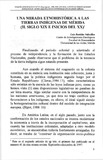Una mirada etnohistórica a las tierras indígenas de Mérida (II. Siglo XIX e inicios del XX)

Voir/
Date
2020Auteur
Palabras Clave
Tierras, Indígenas, División, Legislación, Cordillera de MéridaLand, Indians, Division, Legislation, Cordillera of Mérida
Metadatos
Afficher la notice complèteRésumé
A partir de la revisión de las leyes promulgadas en el siglo XIX e inicios del XX, sobre la cuestión agraria indígena, se analiza con metodología etnohistórica el proceso de adjudicación y división de los resguardos indígenas de Mérida, y como la aplicación de las mencionadas leyes no produjo cambios a favor de la concepción de la propiedad comunal de la tierra que manejan los aborígenes, por el contrario se trató de homogeneizar una sociedad que era socioculturalmente heterogénea, basada dicha homogeneización en el modelo económico liberal y en una política de criollización e ilustración. No obstante, el indígena aprendió a moverse en el sistema jurídico de la naciente República tal como lo había hecho con la legislación colonial y logra por este medio. en la mayoría de los casos, mantener el uso y tenencia comunal de la tierra en ciertas áreas de sus antiguos resguardos.
Colecciones
Información Adicional
| Otros Títulos | An ethnohistorical look at the indigenous lands of Mérida (II. 19th and early 20th centuries) |
| Correo Electrónico | cietluis@ula.ve |
| Editor | SaberULA |
| Resumen en otro Idioma | Reviewing the laws were in the century and the beginning of the twentieth concerning the agrarian indian matter, the author analyses with an ethnohistorical methodology the process of adjugement and division of the indian reservations in Merida-Venezuela. and how the application of these laws produced no positive change in relation to the indian conception of common property. On the contrary, the laws tried to homogenize a society that was social and culturally very different basing the homogeneity on a liberal economical model and a political conception based on ''creolisation" and “'enlightment". However the indian people learned to move in the legal system of the new born Republic, the same way they had done with the colonial legislation, and were able to maintain in this way the domain over his common land in certain areas of his ancient reservations. |
| Colación | 5-51 |
| País | Venezuela |
| Institución | Universidad de Los Andes (ULA) |
| Sección | Boletín Antropológico: Artículos |





